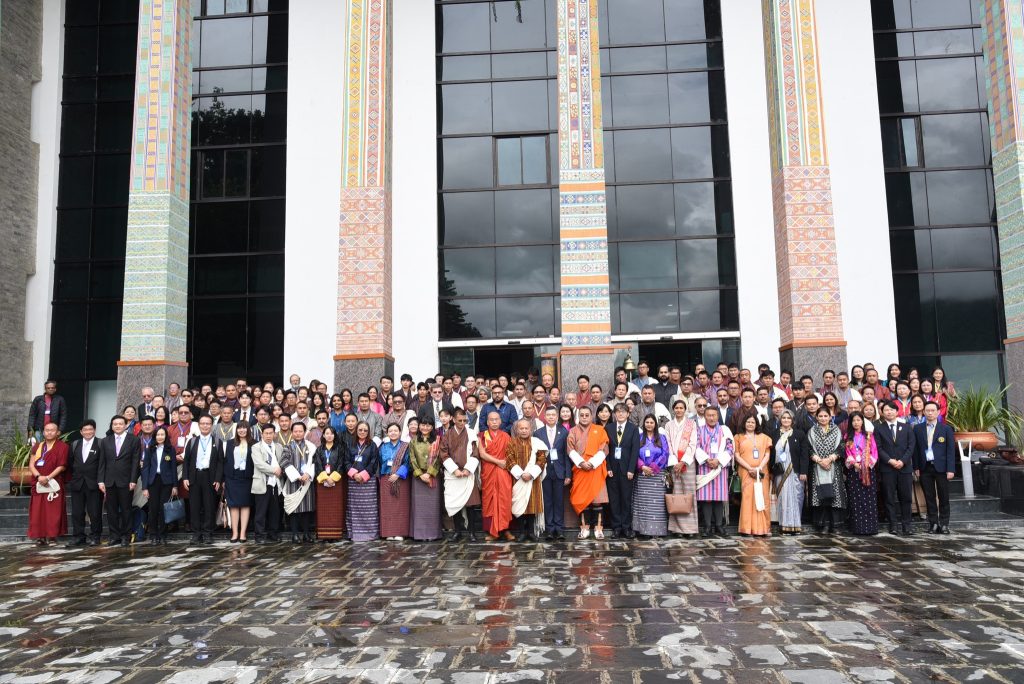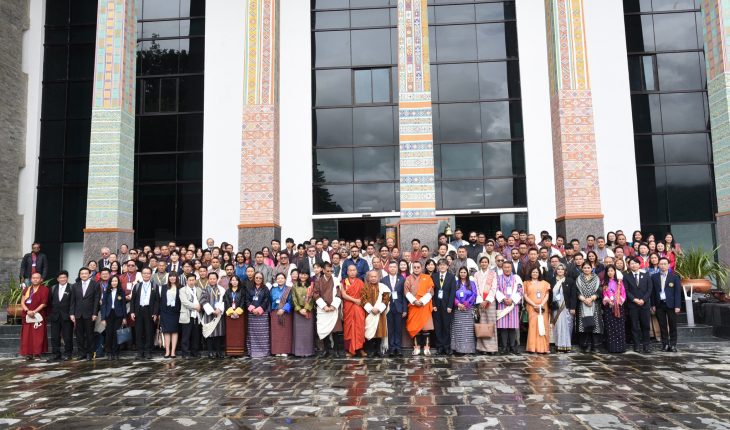
DAWA ZANGMO | Thimphu
Thimphu
The Khesar Gyalpo University of Medical Sciences of Bhutan (KGUMSB) convened the 9th International Conference on Medical and Health Sciences (ICMH 2025) from 28 to 30 August in Thimphu.
The three-day event brought together national and international experts, researchers, policymakers, and practitioners.
The conference deliberated on pressing global and national health challenges under the theme, “A Holistic Approach to Healthy Ageing Amidst Emerging & Re-emerging Communicable Diseases & Demographic Shifts.”
The conference, graced by the Health Minister, Lyonpo Tandin Wangchuk, addressed the convergence of issues shaping the country’s health sector.
Issues like growing double burden of communicable and non-communicable diseases (NCDs), mental health concerns, an ageing population, and declining fertility rates took centerstage.
Participants also examined the socio-economic impacts of demographic transitions, the role of digital health and artificial intelligence, and the importance of cross sectoral and international collaborations in strengthening health systems.
ICMH 2025 also aimed to foster dialogue on how Bhutan and the region can respond to rapid socio economic and demographic transitions.
According to KGUMSB, the theme reflects Bhutan’s remarkable health achievements in past decades while acknowledging the new challenges of the 21st century.
The sessions explored links between communicable and non-communicable diseases, mental health, ageing care, and healthcare delivery models.
Discussions also covered how artificial intelligence and digital innovations can improve health outcomes, especially in countries with limited resources and remote communities.
The conference further examined the implications of declining fertility rates on workforce sustainability and economic resilience, stressing the need for responsive health and social policies.
Around 300 participants, including international delegates, presenters, and panelists, attended the event.
In an exclusive interview, the Director of KGUMSB, Rinzin Jamtsho, highlighted that the outcomes of the conference would not remain confined to academic discourse but would directly inform health policy.
“A comprehensive report consisting of the scientific sessions, policy inputs, and technical recommendations will be shared with the Ministry of Health and all relevant agencies,” Rinzin Jamtsho said.
He said, the Ministry, being the apex body mandated to oversee health policy, regulation, and standards, is best positioned to implement the evidence generated through our research.
He added that the recommendations will also be presented to the Ministry of Health’s High Level Committee (HLC) to ensure broad dissemination and actionable strategies.
This process, according to him, will help strengthen Bhutan’s healthcare system, especially as the country faces challenges of ageing, communicable diseases, and demographic shifts.
Looking beyond the conference, KGUMSB is actively pursuing long-term partnerships with universities across Asia and with development agencies.
The goal, according to the Director, is to undertake collaborative research in public health, infectious diseases, and non-communicable diseases.
“We plan to work closely with donor agencies and development partners to facilitate continuous professional development activities such as short-term training, workshops, seminars, and conferences for healthcare providers,” the Director explained.
Such initiatives, he said, are crucial to building a skilled health workforce capable of addressing both emerging health threats and the country’s shifting demographic profile.
Digital innovation emerged as a central theme during the conference, with strong emphasis on integrating technology into Bhutan’s healthcare system.
The Director underscored that digital health is no longer optional but a necessity, particularly for reaching populations in remote and underserved areas.
The university is also exploring partnerships with technology-affiliated health organizations to introduce solutions such as telemedicine, health information systems, and diagnostic platforms.
“Digital innovation is essential for Bhutan’s health system, especially to bridge gaps for those in remote areas,” he said.
Another priority area is the integration of mental health into primary healthcare. KGUMSB is developing training programs for healthcare providers and community health workers to deliver basic mental health care at the grassroots level.
The Director also revealed that a comprehensive training module on geriatric care is being designed to equip healthcare providers with the skills to address the physical, mental, and social needs of Bhutan’s ageing population.
“Digital health platforms will be leveraged to reach older adults in rural and remote areas, ensuring continuity of care through telemedicine follow-ups, mental health counseling, and chronic disease management. Our goal is a holistic approach where no one is left behind, whether in terms of mental health or elder care,” he further stated.
The Director reiterated KGUMSB’s mission of bridging research with policy, noting that the conference’s deliberations will support evidence-based decision-making in Bhutan’s health sector.
By aligning academic insights with government priorities, the university aims to contribute to inclusive, resilient, and sustainable health systems.
Students at KGUMSB also viewed the conference as a rare learning opportunity to connect theory with practice.
Sonam Choden, a final year medical student, said the sessions deepened her understanding of Bhutan’s health priorities and the challenges ahead.
She noted that issues such as ageing, digital health, and mental health integration are no longer distant policy concepts but realities that will shape the professional landscape for the next generation of doctors.
“This conference has shown us how global health discussions directly link to our national context. For young professionals like us, the focus on telemedicine, artificial intelligence, and integrating mental health into primary care is particularly inspiring,” she said.
Sonam added that it gives them confidence that Bhutan’s health system is preparing for the future, and that it motivates them to contribute meaningfully.
ICMH 2025, with its focus on ageing, communicable and non-communicable diseases, digital health, and demographic shifts, reaffirmed the importance of global and regional cooperation.
For Bhutan, it signaled the beginning of a strategic path toward strengthening healthcare delivery, building professional capacity, and embracing innovation to confront the country’s evolving health needs.



